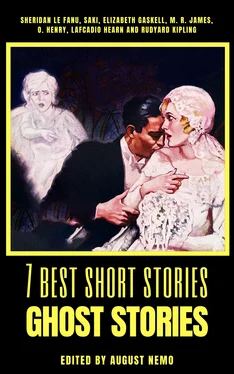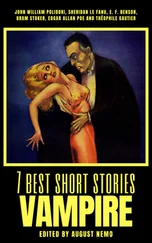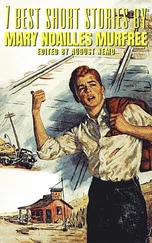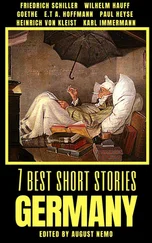The romantic, semi-Gothic, quasi-moral tradition here represented was carried far down the nineteenth century by such authors as Joseph Sheridan LeFanu, Wilkie Collins, the late Sir H. Rider Haggard (whose She is really remarkably good), Sir A. Conan Doyle, H. G. Wells, and Robert Louis Stevenson--the latter of whom, despite an atrocious tendency toward jaunty mannerisms, created permanent classics in Markheim, The Body Snatcher, and Dr. Jekyll and Mr. Hyde. Indeed, we may say that this school still survives; for to it clearly belong such of our contemporary horror-tales as specialise in events rather than atmospheric details, address the intellect rather than a malign tensity or psychological verisimilitude, and take a definite stand in sympathy with mankind and its welfare. It has its undeniable strength, and because of its "human element" commands a wider audience than does the sheer artistic nightmare. If not quite so potent as the latter, it is because a diluted product can never achieve the intensity of a concentrated essence.
Quite alone both as a novel and as a piece of terror-literature stands the famous Wuthering Heights (1847) by Emily Brontë, with its mad vistas of bleak, windswept Yorkshire moors and the violent, distorted lives they foster. Though primarily a tale of life, and of human passions in agony and conflict, its epically cosmic setting affords room for horror of the most spiritual sort. Heathcliff, the modified Byronic villain-hero, is a strange dark waif found in the streets as a small child and speaking only a strange gibberish till adopted by the family he ultimately ruins. That he is in truth a diabolic spirit rather than a human being is more than once suggested, and the unreal is further approached in the experience of the visitor who encounters a plaintive child-ghost at a bough-brushed upper window. Between Heathcliff and Catherine Earnshaw is a tie deeper and more terrible than human love. After her death he twice disturbs her grave, and is haunted by an impalpable presence which can be nothing less thin her spirit. The spirit enters his life more and more, and at last he becomes confident of some imminent mystical reunion. He says he feels a strange change approaching, and ceases to take nourishment. At night he either walks abroad or opens the casement by his bed. When he dies the casement is still swinging open to the pouring rain, and a queer smile pervades the stiffened face. They bury him in a grave beside the mound he has haunted for eighteen years, and small shepherd boys say that he yet walks with his Catherine in the churchyard and on the moor when it rains. Their faces, too, are sometimes seen on rainy nights behind that upper casement at Wuthering Heights. Miss Bronte's eerie terror is no mere Gothic echoe, but a tense expression of man's shuddering reaction to the unknown. In this respect, Wuthering Heights becomes the symbol of a literary transition, and marks the growth of a new and sounder school.
SPECTRAL LITERATURE ON THE CONTINENT
ON the continent literary horror fared well. The celebrated short tales and novels of Ernst Theodor Wihelm Hoffmann (1776-1822) are a by-word for mellowness of background and maturity of form, though they incline to levity and extravagance, and lack the exalted moments of stark, breathless terror which a less sophisticated writer might have achieved. Generally they convey the grotesque rather than the terrible. Most artistic of all the continental weird tales is the German classic Undine (1814), by Friedrich Heinrich Karl, Baron de la Motte Fouqué. In this story of a water-spirit who married a mortal and gained a human soul there is a delicate fineness of craftsmanship which makes it notable in any department of literature, and an easy naturalness which places it close to the genuine folk-myth. It is, in fact, derived from a tale told by the Renaissance physician and alchemist Paracelsus in his Treatise on Elemental Sprites.
Undine, daughter of a powerful water-prince, was exchanged by her father as a small child for a fisherman's daughter, in order that she might acquire a soul by wedding a human being. Meeting the noble youth Huldbrand at the cottage of her fosterfather by the sea at the edge of a haunted wood, she soon marries him, and accompanies him to his ancestral castle of Ringstetten. Huldbrand, however, eventually wearies of his wife's supernatural affiliations, and especially of the appearances of her uncle, the malicious woodland waterfall-spirit Kuhleborn; a weariness increased by his growing affection for Bertalda, who turns out to be the fisherman's child for whom Undine was changed. At length, on a voyage down the Danube, he is provoked by some innocent act of his devoted wife to utter the angry words which consign her back to her supernatural element; from which she can, by the laws of her species, return only once--to kill him, whether she will of no, if ever he prove unfaithful to her memory. Later, when Huldbrand is about to be married to Bertalda, Undine returns for her sad duty, and bears his life away in tears. When he is buried among his fathers in the village churchyard a veiled, snow-white female figure appears among the mourners, but after the prayer is seen no more. In her place is seen a little silver spring, which murmurs its way almost completely around the new grave, and empties into a neighboring lake. The villagers show it to this day, and say that Undine and her Huldbrand are thus united in death. Many passages and atmospheric touches in this tale reveal Fouqué as an accomplished artist in the field of the macabre; especially the descriptions of the haunted wood with its gigantic snow-white man and various unnamed terrors, which occur early in the narrative.
Not so well known as Undine, but remarkable for its convincing realism and freedom from Gothic stock devices, is the Amber Witch of Wilhelm Meinhold, another product of the German fantastic genius of the earlier nineteenth century. This tale, which is laid in the time of the Thirty Years' War, purports to be a clergyman's manuscript found in an old church at Coserow, and centres round the writer's daughter, Maria Schweidler, who is wrongly accused of witchcraft. She has found a deposit of amber which she keeps secret for various reasons, and the unexplained wealth obtained from this lends colour to the accusation; an accusation instigated by the malice of the wolf-hunting nobleman Wittich Appelmann, who has vainly pursued her with ignoble designs. The deeds of a real witch, who afterward comes to a horrible supernatural end in prison, are glibly imputed to the hapless Maria; and after a typical witchcraft trial with forced confessions under torture she is about to be burned at the stake when saved just in time by her lover, a noble youth from a neighboring district. Meinhold's great strength is in his air of casual and realistic verisimilitude, which intensifies our suspense and sense of the unseen by half persuading us that the menacing events must somehow be either the truth or very dose to the truth. Indeed, so thorough is this realism that a popular magazine once published the main points of The Amber Witch as an actual occurrence of the seventeenth century!
In the present generation German horror-fiction is most notably represented by Hanns Heinz Ewers, who brings to bear on his dark conceptions an effective knowledge of modem psychology. Novels like The Sorcerer's Apprentice and Alrune, and short stories like The Spider, contain distinctive qualities which raise them to a classic level.
But France as well as Germany has been active in the realm of weirdness. Victor Hugo, in such tales as Hans of Iceland, and Balzac, in The Wild Ass's Skin, Seraphita, and Louis Lambert, both employ supernaturalism to a greater or less extent; though generally only as a means to some more human end, and without the sincere and dæmonic intensity which characterizes the born artist in shadows. It is in Theophile Gautier that we first seem to find an authentic French sense of the unreal world, and here there appears a spectral mystery which, though not continuously used, is recognizable at once as something alike genuine and profound. Short tales like Avatar, The Foot of the Mummy, and Clarimonde display glimpses of forbidden vistas that allure, tantalize, and sometime horrify; whilst the Egyptian visions evoked in One of Cleopatra's Nights are of the keenest and most expressive potency. Gautier captured the inmost soul of æon-weighted Egypt, with its cryptic life and Cyclopean architecture, and uttered once and for all the eternal horror of its nether world of catacombs, where to the end of time millions of stiff, spiced corpses will stare up in the blackness with glassy eyes, awaiting some awesome and unrelatable summons. Gustave Flaubert ably continued the tradition of Gautier in orgies of poetic phantasy like The Temptation of St. Anthony, and but for a strong realistic bias might have been an arch-weaver of tapestried terrors. Later on we see the stream divide, producing strange poets and fantaisistes of the symbolic and decadent schools whose dark interests really centre more in abnormalities of human thought and instinct than in the actual supernatural, and subtle story-tellers whose thrills are quite directly derived from the night-black wells of cosmic unreality. Of the former class of "artists in sin" the illustrious poet Baudelaire, influenced vastly by Poe, is the supreme type; whilst the psychological novelist Joris-Karl Huysmans, a true child of the eighteen-nineties, is at once the summation and finale. The latter and purely narrative class is continued by Prosper Merimée, whose Venus of Ille presents in terse and convincing prose the same ancient statue-bride theme which Thomas Moore cast in ballad form in The Ring.
Читать дальше

![Коллектив авторов - Best Short Stories [С англо-русским словарем]](/books/26635/kollektiv-avtorov-best-short-stories-s-anglo-thumb.webp)










